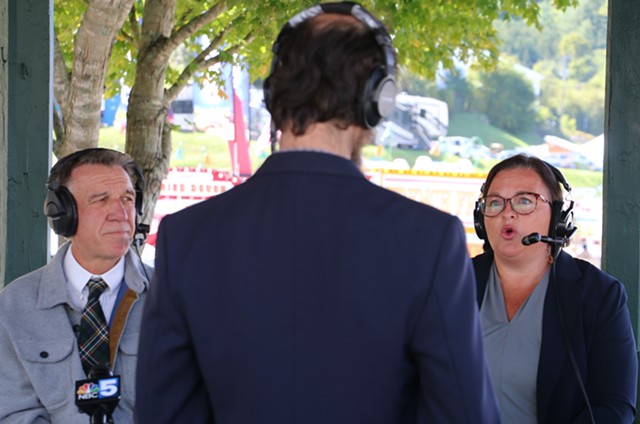
- Kevin McCallum ©️ Seven Days
- Gov. Phil Scott and candidate Brenda Siegel
Siegel, a Newfane activist, sought to steer attention away from the state’s response to the pandemic, for which the Republican governor has earned high marks, and toward issues she feels he has failed to address — or actively thwarted — during his six years heading the state.
“There was already a housing crisis. There was already an overdose crisis. There was already a climate crisis, and a mental health crisis, and we need leadership on those issues,” Siegel said in her opening remarks.
Scott, meanwhile, stressed the success of his administration’s handling of the pandemic, but acknowledged the response set back efforts in other areas, such as growing the economy and the workforce.
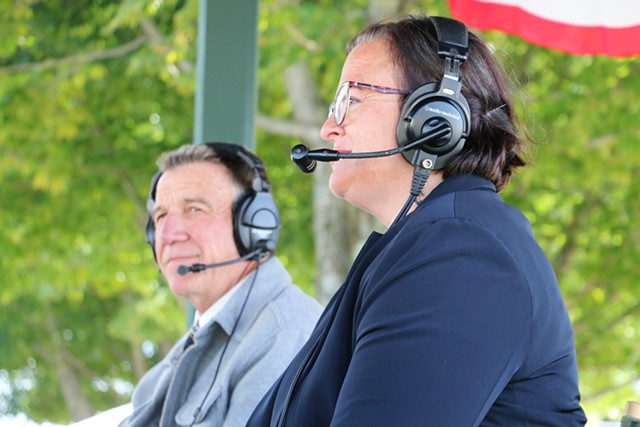
- Kevin McCallum ©️ Seven Days
- Gov. Phil Scott and candidate Brenda Siegel
“That’s something we’ve been focused on and will continue to focus on if I’m elected in November,” he said.
The debate was hosted by radio station WDEV and was broadcast live from the Tunbridge World’s Fair. It was preceded by a debate between lieutenant governor candidates Sen. Joe Benning (R-Caledonia) and former LG David Zuckerman, a Democrat.
The debate format did not allow candidates to ask questions of each other, so there were no fireworks and only a handful of sharp exchanges.
Throughout the debate, however, there were plenty of sights, sounds and smells of rural Vermont on display. The stiff breeze that sent candidates’ talking points sailing also wafted the pungent aroma of the cattle barn through the debate gazebo. At times, a rooster seemed to have as much to say as the candidates.
Though the debate was civil, it highlighted stark differences between the two candidates, including a fundamental disagreement about whether Scott has worked well with — or obstructed — the Democrat-controlled legislature.
During one exchange about the state’s underfunded pensions, Siegel seemed to take offense at Scott’s portrayal of lawmakers as pretending to have solved the problem.
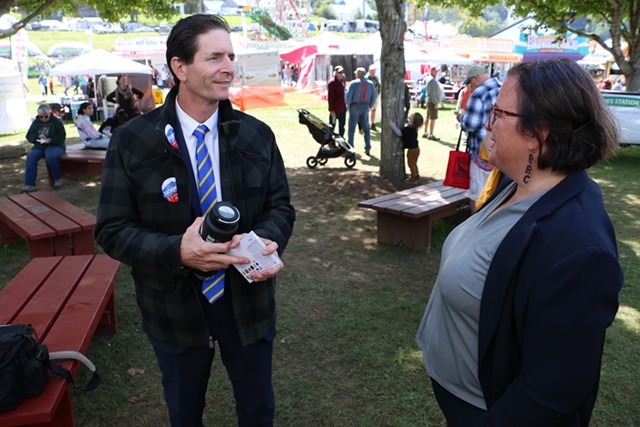
- Kevin McCallum ©️ Seven Days
- David Zuckerman chats with Brenda Siegel after their debates
The savings were to come from a combination of lower benefits, higher payments by workers and a $200 million cash infusion from the state. Scott said the deal lacked the structural reforms needed to prevent the problem from recurring in a few years.
Related Scott Vetoes $200 Million Pension Reform Bill
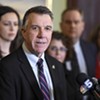
Siegel noted that lawmakers, including Republicans, worked tremendously hard on a deal and overwhelmingly overrode the governor’s veto by a near-unanimous vote.
“That veto itself said to your employees, the state employees, and to our teachers, who raise our children, that they don’t matter — that a pension is not a promise,” Siegel said.
One of the more intense exchanges of the debate flared over the Scott administration's decision to wind down a pandemic-era housing program called the Vermont Emergency Rental Assistance Program.
Siegel, a homeless advocate who slept outside the Statehouse for 28 days last year to pressure Scott to preserve programs for the homeless, has lambasted the administration’s handling of the program.
Related Heeding Activists' Demands, the State Will House Homeless Vermonters in Motels This Winter

“I don’t know how you run a government making a mistake like that and then place that mistake on the most marginalized across our state,” Siegel said, her voice cracking.
Scott, who has heard the critique from Siegel multiple times over the last two weeks, expressed exasperation.
“There is so much misinformation that my opponent is emitting, that I don’t know where to start,” he said.
Related Pandemic-Era Rental Assistance Program to End Abruptly for Thousands

At one point, there were 90,000 people out of work in the state. Today that number is 1,500, he said. Many other states are struggling with how to deal with populations housed with federal pandemic assistance, and he said his administration will continue to look for alternatives.
“It’s a challenge for all of us, but this isn’t something that we can continue to do,” he said.
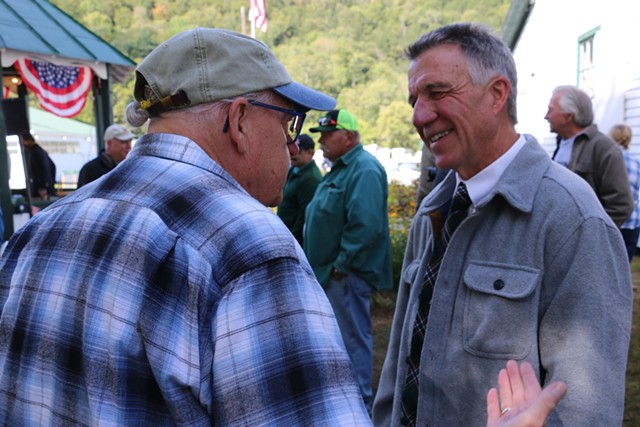
- Kevin McCallum ©️ Seven Days
- Gov. Phil Scott chats with supporter Laurence Jost
Scott countered that he vetoed the bill because lawmakers had effectively passed the buck to regulators.
“They were giving it to the Public Utility Commission to do all the dirty work,” he said.
Siegel also accused Scott of not doing enough to support the generation of renewable energy in the state. Scott argued that the electric grid can't handle additional renewables without additional battery storage capacity, and he reiterated his opposition to wind turbines.
“I don’t apologize for not wanting to see wind generation on those ridgelines behind us, because we have alternatives, and this is [hydroelectric power] from Hydro-Québec,” he said.
One thing the candidates agreed on was that women should have the right to an abortion. Both said they would be voting for Proposal 5, also known as Article 22, the ballot measure that would enshrine “personal reproductive liberty” into the state constitution.

- Kevin McCallum ©️ Seven Days
- The candidates squared off at the gazebo at the Tunbridge World's Fair
Lee Kittell asked whether the tens of millions of abortions performed in the country since 1973, when the U.S. Supreme Court legalized the procedure in Roe v. Wade, “is at least part of the reason” for the acute worker shortage.
Scott said he was “not sure you can draw that conclusion,” before going on to describe the need to bring more families into the state.
Siegel said one definitely cannot draw that conclusion and called it offensive to women “to even suggest that we maybe should have had babies that we were not prepared to have in order to develop a workforce for our country or state,” Siegel said.
After the debate, Kittell said the question, which he said he wrote, was valid and was meant to be challenging.
“Curveballs are good in debates like this,” he said.

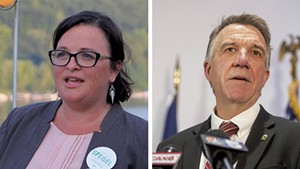
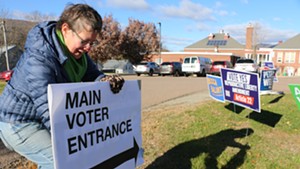
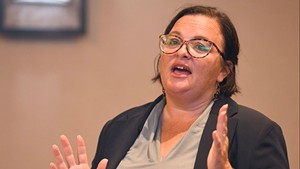










Comments
Comments are closed.
From 2014-2020, Seven Days allowed readers to comment on all stories posted on our website. While we've appreciated the suggestions and insights, right now Seven Days is prioritizing our core mission — producing high-quality, responsible local journalism — over moderating online debates between readers.
To criticize, correct or praise our reporting, please send us a letter to the editor or send us a tip. We’ll check it out and report the results.
Online comments may return when we have better tech tools for managing them. Thanks for reading.